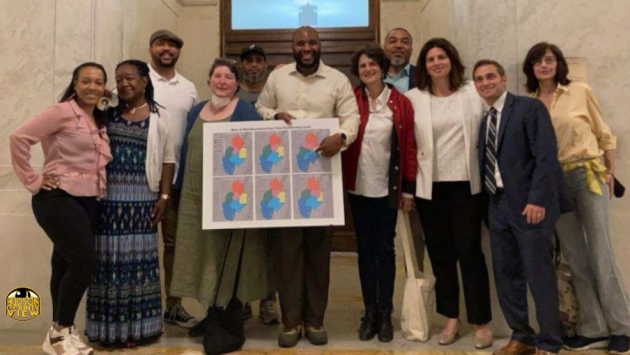The Jersey City ward map lawsuit was revived today after a single count was reinstated on appeal, specifically the one challenging if the Municipal Ward Law was violated.
By John Heinis/Hudson County View
“We affirm the dismissal of plaintiffs’ claims asserting violations of their constitutional rights, the [New Jersey Civil Rights] Act, and the OPMA [Open Public Meetings Act],” wrote Superior Court of New Jersey Appellate Division Judges Robert J. Gilson, Patrick DeAlmeida, and Avis Bishop Thompson in their 29-page decision.
“We reverse the dismissal of the claims of violations of the MW Law. Resolution of those statutory claims requires some, albeit limited, fact-finding. Thus, we remand the MW [Municipal Ward] Law claims for further proceedings.”
The Board of Ward Commissioners approved new ward maps for each of Jersey City’s six wards back in January 2022, with the appellate court noting that this typically occurs every 10 years in conjunction with the U.S. Census.
With Ward E being 59 percent more populous than neighboring Ward D (69,524 residents vs. 40,733), that was well beyond the 10 percent needed to necessitate municipal redistricting.
Two lawsuits challenged the maps, one filed by James Calderon and another by a wide coalition of city residents known as Jersey City United against the New Ward Map, which includes Ward F Councilman Frank “Educational” Gilmore.
They were consolidated and dismissed in Hudson County Superior Court in August 2022.
The appellate court then heard arguments from both the plaintiffs and defendants in the case back in November and it was unclear if or when they would hear on the case until it appeared on the court’s upcoming docket yesterday.
” … We hold that two rules govern a court’s limited review of a commission’s adjustment of wards when there is no claim of invidious discrimination or partisan gerrymandering. First,
the boundaries and map can only be challenged on the basis that they violate any of the three MW Law requirements of compactness, contiguousness, or population deviation,” the appellate court wrote in their ruling.
“Challenges based on general, but undefined, concepts of ‘communities of interest’ or ‘historic neighborhoods’ are not viable. While communities of interest and neighborhoods are clearly important, the Legislature did not include those considerations in the MW Law. Second, the role of a court in reviewing compactness is limited. A ward need not be as tight as possible, and the realities of geography will require some amount of elongation and jagged boundaries.”
They continue that while the court should not consider if a more compact version could or should exist, a limited fact finding process should still be conducted, which may include cross examining the commissioners who prepared and voted on the map.
“On a motion to dismiss, and without any factual record, the trial court in these matters simply concluded that the wards were compact. The court needed to conduct some proceeding focused on the question of whether there was a rational basis for the Commission’s configuration of the wards. That proceeding, however, should be limited,” the appellate court determined.
“Given the allegations in plaintiffs’ complaints, they are not entitled to discovery, and
the fact-finding proceedings should be carefully restricted. The inquiry is simply to determine if the Commissioners had a rational basis for their configuration, so the court can then determine whether the wards are compact, given the flexibility afforded by the MW Law. The trial court will have discretion to allow focused cross-examination of one or more Commissioners, provided that examination is limited to the rational basis for the compactness of the wards.”
The court continues that the claim that the commission retaliated against Gilmore politically by moving supporters and certain projects out of his ward was purely speculative and does not rise to a right or privilege protected by New Jersey laws.
“In summary, we affirm the dismissal of plaintiffs’ constitutional claims and their claims under the OPMA and the CR Act. We reverse and remand the claims under the MW Law for a focused and limited proceeding on whether the Commission had a rational basis for the ward boundaries and map it adopted,” the court concludes.
“That rational basis may well be set forth in the Commission’s report. If so, the Commissioners can certify that rational basis, and the trial court can then determine if that is sufficient. On the current record, plaintiffs are not entitled to discovery from or depositions of the Commissioners.”
Mayor Steven Fulop responded to a social media post from this reporter about the appellate court’s decision, deriding the merits of the lawsuit.
“This entire lawsuit was silly and a manufactured issue/waste of time. Anyone who looked at the data behind the redistricting objectively would have come to the same conclusion as the courts,” he wrote.
Renee Steinhagen of New Jersey Appleseed Public Law Center, co-council for the plaintiffs, applauded the remand and said another appeal is forthcoming.
“We are pleased that the appellate court reversed the lower court dismissal of the case in part and found that we had a strong basis to support our challenge to the revised JC map under the Municipal Ward Law, she told HCV.
“We look forward to examining the Commissioners to better understand their basis for approving a map where Ward F’s ‘jagged, L-shaped’ boundaries simply do not meet the common dictionary meaning of “compactness.” We also look forward to appealing the dismissal of our other claims, including those under the NJ Constitution and the NJ Civil Rights Act to the Nj Supreme Court.”
Additionally, city spokeswoman Kimberly Wallace-Scalcione noted that the appellate court rejected the heart of the lawsuit and the matter being remanded was simply a procedural issue.
“The court wholly rejected every single one of the plaintiff’s arguments and made it clear that all claims of discrimination and political gerrymandering were baseless and without merit. The limited proceeding to follow is simply for the judge to confirm his finding that the wards are compact on the record.”
Editor’s note: This story was updated with a comment from city spokeswoman Kimberly Wallace-Scalcione.









